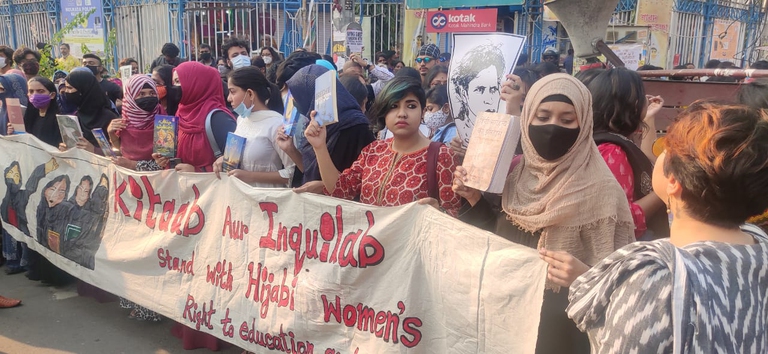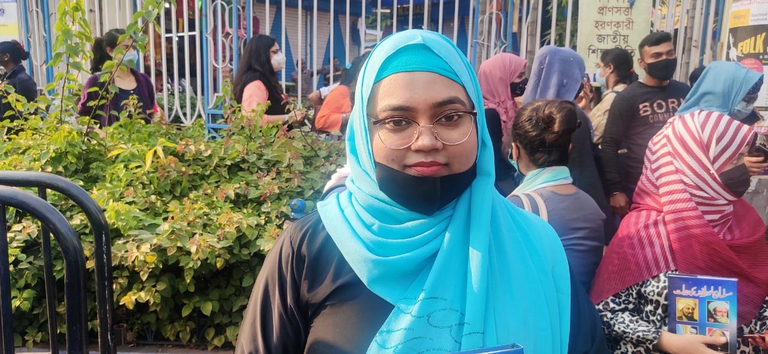
A new travelling exhibition, which is being shown in various parts of the Andean country Ecuador, seeks to make the important work of Ecuadorian women scientists visible. Because women need science and science needs women.
The Hijab ban has caused a major controversy in India after several Muslim girls were denied entry into a college for wearing the traditional headscarf.
For the past few days, Sakhra Sarwar has taken to the streets. The 23-year-old is a college student in Kolkata, the capital of West Bengal state in eastern India. Sakhra has been taking part in almost all the protest rallies that are being organized in relation to the hijab controversy, which has brought the Indian Muslims to the streets and started a fierce debate about their fundamental rights.
The controversy began in the first week of January when six female students in a government-run Pre-University College claimed that they were denied entry for wearing a hijab, the traditional Muslim headscarf that covers the head and neck. The incident took place in the Karnataka state of southern India, where the ruling party is the BJP (Bharatiya Janata Party), the right-wing party that also holds a majority in the national parliament. Over the following weeks, the hijab ban spread to other schools and colleges in the state.
The situation snowballed further when students wearing Hindu scarves shouted chants at a Muslim girl wearing a hijab in January. The student, whose name is Muskan Bibi, retaliated by shouting slogans from her own faith. This incident escalated the controversy. The Muslim community has since taken to the streets to protest the hijab ban. They believe wearing the traditional veil is part of their fundamental right to practise their religion.
“We have never questioned people from different religions who wear their mark of faith. Why we are being questioned? What is wrong with wearing a hijab? It proves our identity. How anybody can question it?” said Sakhra, who was among the many women who took part in a protest rally in Kolkata. The women that took part in the protest carried books by Virginia Woolf, Samuel Beckett, and Arundhati Roy, among other authors. The rally was called “Kitaab aur Inquilab” (Books and Revolution), as they claimed books to be synonymous with their revolution.
“The right-wing ecosystem [a reference to the rule of the BJP in India, ed.] has been boasting about offering education to every section of India’s population. But their claims are misleading. The hijab controversy has been tactically played to deprive Muslim girls of education and sideline us from any benefits available from the government. Lack of education would further alienate us in society. We will not allow this to happen at any cost and will fight till the end,” said Shahina Nasim, 24, also a college student and a friend of Sakhra. “The absence of education would also result in utter poverty for us and our future generations. They want us to live an impoverished life and have no say in any issues of the country.”
Several women from the minority community who took part in the protest asserted that the right-wing supporters have managed to polarise society and change the mindset of the people. “The divide is clearly visible in our daily lives and society. Our Hindu friends from other castes who mixed freely with us in the past have now started to maintain a sort of distance. Even though they still speak with us, the divide is quite visible. Things are no longer the same as before. Our country was known worldwide for its secular nature and democracy but both these values that we were proud of have come under threat during the current regime,” said Shafqat Rahim, 28, a practising lawyer.
Many social workers from the minority community describe the attack on hijab-wearing as part of an onslaught against Islamic values. “Our religion gives women the right to wear a hijab. They have been wearing it since time immemorial. A fanatic regime cannot simply change our values and force us to accept something which our religion doesn’t allow. We have no issues with Sikhs wearing turbans or Hindus wearing religious threads. Why we are being questioned for practising our religion? It is simply an agenda to push us back so that we live in perpetual fear and lose our voice in expressing our opinions in any matter of the country,” said Rafay Siddique, a social activist.
Fuelled by politicians, the controversy has been raging despite the strong protest by the minority community. The state of Karnataka, which is ruled by the BJP, submitted to the Karnataka High Court on 18 February that the hijab is not an essential religious practice of the Muslim faith and preventing it doesn’t violate the constitutional guarantee of religious freedom.
The hijab ban is just the latest in a series of issues in India where the minority community has been forced to take to the streets. Since the BJP government took to power in 2014, issues like National Registrar of Citizens (NRC) and Citizenship Amendment Act (CAA) asking Muslims to prove their citizenship have kept political tensions high.
Many believe that such issues are designed to tactically sideline the Muslim community and polarise voters, who would then be more likely to vote for a specific party. “There is nothing new in what the BJP is doing. The British also practised “divide and rule” in India. They are simply trying to divide the two communities to garner more votes among the Hindus and stay in power. It is only possible when Muslims are completely sidelined and do not have ample opportunities in education and jobs. These controversies also help politicians distract the people from serious topics like unemployment and inflation, which are rampant in the country, keeping their vote reserves intact,” said political analyst Sujay Verma.
Siamo anche su WhatsApp. Segui il canale ufficiale LifeGate per restare aggiornata, aggiornato sulle ultime notizie e sulle nostre attività.
![]()
Quest'opera è distribuita con Licenza Creative Commons Attribuzione - Non commerciale - Non opere derivate 4.0 Internazionale.
A new travelling exhibition, which is being shown in various parts of the Andean country Ecuador, seeks to make the important work of Ecuadorian women scientists visible. Because women need science and science needs women.
Meet Gokul Subedi and Prakriti Mainali, the founders of two humanitarian organisations with one shared goal: to improve the lives of the most vulnerable and disadvantaged members of Nepalese society.
Brazil’s Supreme Federal Court has indefinitely shelved a case that was set to drastically alter indigenous land right claims, leaving its fate uncertain.
Animal Equality reveals the brutality of Europe’s pig meat industry and illegal activities on farms for which many perpetrators haven’t yet been punished.
Jenu Kuruba, a honey-collecting indigenous tribe of India, accuses the local government of forcefully evicting them from the forest that is their home.
The state of women’s rights in Turkey is critical, and gender-based violence is increasing. The country’s withdrawal from the Istanbul Convention will only make matters worse.
One in three women have suffered physical or sexual violence. With contributions from Europe, Africa, Asia and Latin America, we look at how this shadow pandemic affects every corner of the world.
The Istanbul Convention against gender-based and domestic violence marks its tenth anniversary. We look at what it is, who its signatories are, and what the future might hold.
Considered useless, billions of male chicks are killed every year by the egg industry using cruel methods. But consumers can demand more humane practices.










